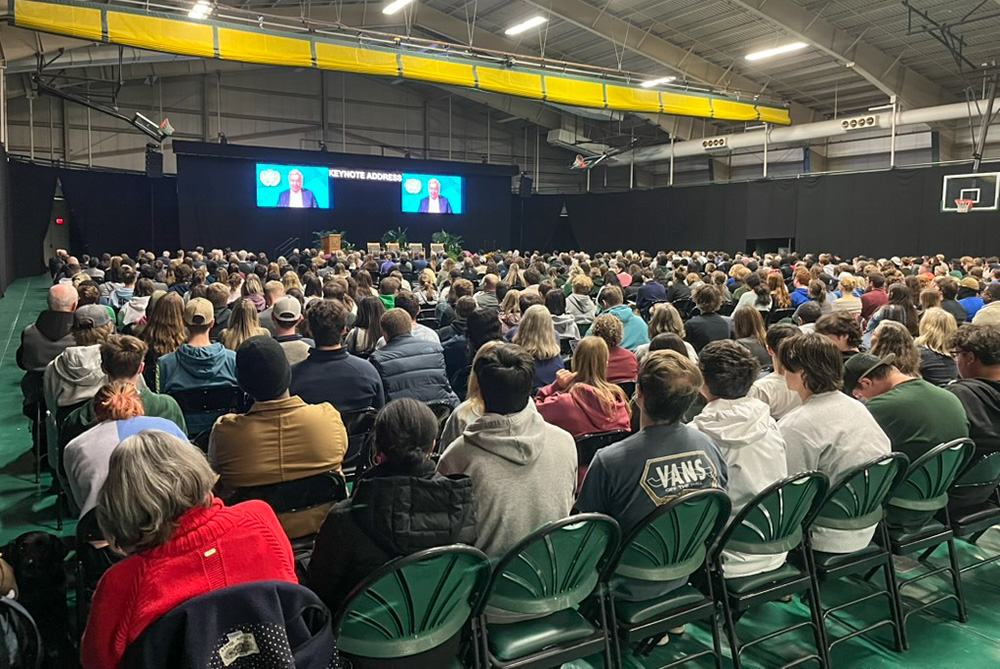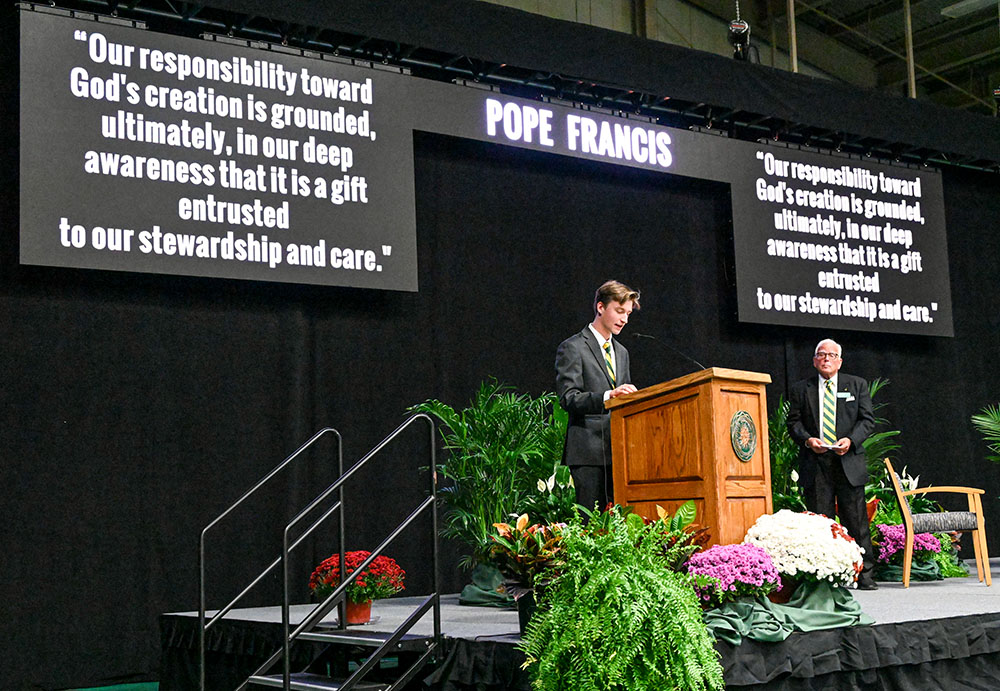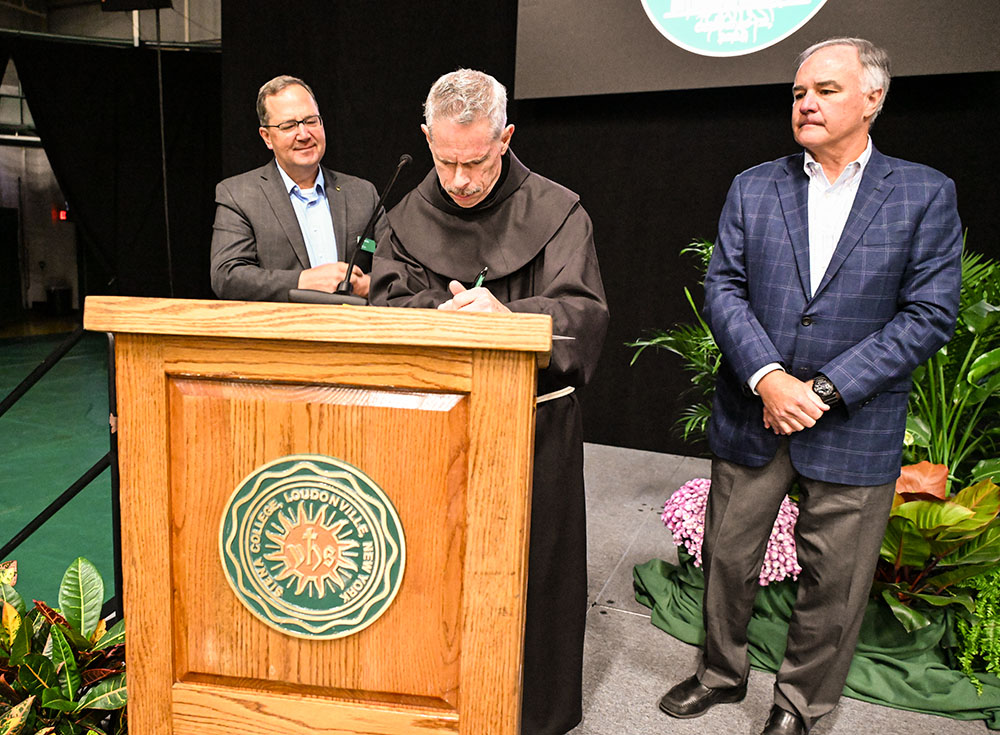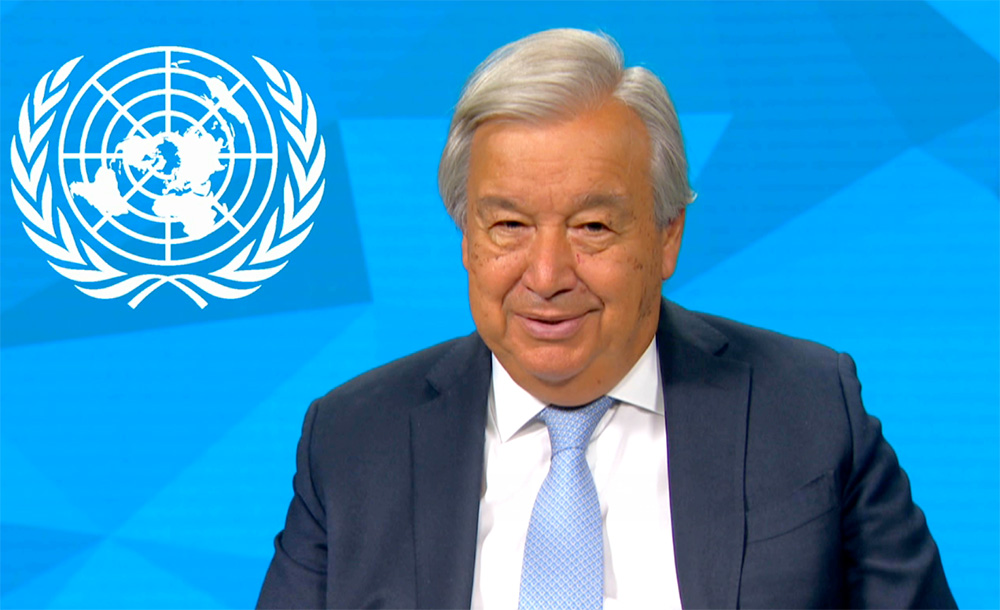
Students, staff and visitors at Siena College in Loudonville, New York, watch a video message from U.N. Secretary-General António Guterres in the Marcelle Athletic Center Oct. 10 at the opening of the Franciscan school's symposium on integral ecology. (Courtesy of Siena College)
Destructive impacts from climate change around the world are putting peace and justice "in peril," the head of the United Nations said at an ecology conference Oct. 10 at Siena College, a Franciscan university in upstate New York.
António Guterres, the ninth U.N. secretary-general, in a prerecorded message told an audience of more than 1,000 students, staff and visitors that the values embodied by St. Francis of Assisi and espoused by Pope Francis demand countries deliver on pledges to rapidly slash heat-trapping greenhouse gas emissions and limit global warming to 1.5 degrees Celsius (2.7 degrees Fahrenheit), the high-end target under the Paris Agreement.
"Today, floods and droughts are fueling instability, driving conflict and forcing people from their homes," he said. "And though climate chaos is everywhere, it doesn't affect everyone equally. The very people most at risk are those who did the least to cause the crisis: small island states, developing countries, the poor and the vulnerable. This is breathtaking injustice, and it is just the beginning."
"Brothers and sisters," he later added, "we cannot accept a future where the rich are protected in air-conditioned bubbles while the rest of humanity is lashed by lethal weather in unlivable lands."
The U.N. leader's remarks came on the opening night of a two-day symposium on integral ecology at Siena College in Loudonville, New York, outside Albany. The conference is focused on the local and global consequences of climate change and responses to the social and ecological crisis in the spirit of Francis of Assisi, patron saint of ecology, and his namesake, Pope Francis.

Siena College senior Timothy Nigro reads a letter from Pope Francis to the Franciscan school sent in support of its two-day symposium on integral ecology. (Courtesy of Siena College)
On Friday morning, a Siena senior read a letter from the pope, who encouraged the symposium to draw attention to the ethical and spiritual implications of the global environmental crisis.
"The gravity of the threats to our common home calls not only for technical and political solutions," Francis wrote. "It likewise demands an ecological conversion which recognizes that issues of environmental justice cannot be separated from the greater pursuit of an integral human development for all the members of our human family, especially the poor and those who have no voice."
In his speech, Guterres described a world "in trouble," one "witnessing real-time climate collapse" due to emissions released primarily from human activities such as burning coal, oil and gas.
He pointed to high-temperature records shattering around the globe and extreme weather becoming more intense — from hurricanes striking the United States and the Caribbean, to blistering heat in Africa and Asia — and massive coral bleaching "caused by unprecedented ocean temperatures."
"All this puts peace and justice in peril, as St. Francis would have understood," Guterres said.
It was Franciscan connections that led to the U.N. secretary-general's appearance, albeit by video, at Siena College.
Br. Michael Perry, who served as head of the global Franciscan order from 2013 to 2021 and now directs Siena's Laudato Si' Center for Integral Ecology, met in April alongside two fellow Franciscans with the secretary-general about participating in the symposium.

From left: Siena College President Charles Seifert, Franciscan Br. Michael Perry and Thomas Baldwin Jr., president of Siena's Board of Trustees, sign a resolution on sustainability, adopted by the board in March and publicly signed Oct. 11 as part of the college's integral ecology symposium. (Courtesy of Siena College)
A native of Portugal, Guterres said his personal links to the Franciscans "run deep," as a Franciscan priest and lifelong friend presided at both his wedding ceremonies, baptized his children and has celebrated Mass in his home.
"And as an António from Lisbon, I have a strong connection with Santo António, one of the first Franciscans," he said.
But it was a Jesuit named Francis — Pope Francis — that the U.N. leader cited most, including his 2015 encyclical "Laudato Si', on Care for Our Common Home."
"Pope Francis tells us that, and I quote, 'When we exploit creation, we destroy the sign of God's love for us.' He reminded us that human beings are custodians of this creation, not masters of it," Guterres said. "We must stop intentionally destroying our natural world and its gifts. We must protect people from the destruction we have unleashed, and we must deliver climate justice for the vulnerable."
While his video speech played in New York, Guterres was in Laos for a U.N. summit with the Association of Southeast Asian Nations, where he also addressed climate change.
A busy fall awaits the secretary-general, with three major international environmental meetings in the next several months.
Later in October, countries will gather in Cali, Colombia, for the COP16 biodiversity conference, the first since nations in 2022 reached an agreement to halt and reverse the rapid loss of biodiversity, with a target of conserving 30% of the world's lands and waters by 2030. Then in November the COP29 U.N. climate conference will begin in Baku, Azerbaijan. And later that month, countries will convene in South Korea for the fifth and final round of negotiations on a global plastic pollution treaty.
Advertisement
Scientists have stated global emissions need to decline by 43% over the next five years to keep the 1.5 C temperature limit within reach. A study published this week in the scientific journal Nature found that scenarios where global temperatures temporarily surpass, or "overshoot," 1.5 C would still see some climate impacts persisting for hundreds if not thousands of years, while others would be irreversible.
Guterres called it "vital" to achieve the 1.5 C target.
"Every fraction of a degree of global heating counts. The difference between the temperature rise at 1.5 and 2 degrees could be the difference between extinction and survival for some small island states and coastal communities, and the difference between minimizing climate chaos or crossing dangerous tipping points," he said, such as the collapse of ice sheets in Greenland and Antarctica.
Guterres added it was essential that developed nations, like the U.S., follow through on past promises of financing to assist developing countries reducing their emissions and adapting to climate impacts they're already facing, and contribute to the new Loss and Damage Fund. Climate finance will be a main focus at COP29.

U.N. Secretary-General António Guterres says "our world is in trouble" due to climate change in a video message at Siena College's symposium on integral ecology Oct. 10. (Courtesy of Siena College)
"Developing countries can neither cut emissions nor protect themselves if money is not available. ... This must change," Guterres said.
The U.N. chief told the Siena community that religious communities and young people have "a vital role" to play in advancing action on climate change. On Friday, Siena President Charles Seifert, along with Perry and board president Thomas Baldwin Jr., publicly signed a resolution on sustainability that the board adopted in March.
Throughout other sessions of the conference, conversations about what students can do about climate change continually turned to the November elections.
"As citizens and especially young people and students," said Medha Palnati, a Siena alumna who is currently a medical student at Albany Medical College, "our voice in government really matters, and we can vote and also advocate for local change."





